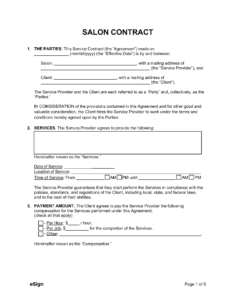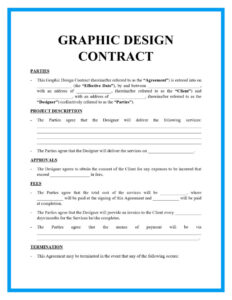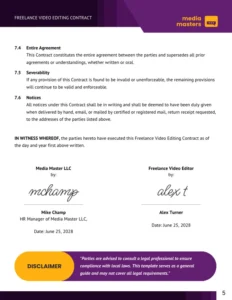Navigating the world of freelance work or small business ownership often brings a mix of excitement and a touch of apprehension. One of the biggest keys to a smooth operation, and something many often overlook until it’s too late, is having a clear, written agreement with your clients. This is where a basic contract for services template becomes an absolute game-changer, providing a solid foundation for any professional relationship.
It’s more than just a formality; it’s about setting expectations, protecting your interests, and ensuring everyone involved understands their roles and responsibilities. Having a well-structured agreement from the outset minimizes misunderstandings, prevents scope creep, and gives you peace of mind, allowing you to focus on delivering excellent service.

Why You Absolutely Need a Basic Contract for Services
Entering into a service agreement without a written contract can feel like walking a tightrope without a net. It leaves too much to chance and can lead to serious headaches down the line. A properly drafted contract clarifies the terms of engagement for both parties, ensuring that everyone is on the same page regarding the work to be performed, the timelines, and, crucially, the payment structure. It acts as a safety net, protecting your business from potential disputes and misunderstandings.
Think about it: what happens if a client decides they want extra work done beyond the initial agreement? Or if they delay payments without explanation? Without a contract, these situations can quickly escalate into frustrating and costly problems. A contract provides a clear reference point, detailing the scope of work, revision policies, and what constitutes an additional service, preventing "scope creep" from eroding your profits and time.
Furthermore, a contract solidifies your professional standing. Presenting a clear, comprehensive agreement shows that you are serious about your work and respect the client’s investment. It fosters trust and establishes a professional boundary, making it easier to discuss potential issues should they arise. This level of professionalism can differentiate you from competitors who might be less organized.
Beyond the immediate project, a contract offers legal protection. In the unfortunate event of a dispute, the contract serves as a binding legal document that outlines the responsibilities and obligations of each party. It can specify dispute resolution methods, such as mediation or arbitration, which can save both parties significant time and money compared to lengthy court battles. This layer of legal security is invaluable for any service provider.
Ultimately, a basic contract for services template empowers you to focus on what you do best: providing your services. By spending a little time upfront to customize a template, you save countless hours of potential stress and conflict later. It’s an essential tool for building a sustainable and respected service-based business.
Key Elements to Look For in Your Contract Template:
- **Parties Involved:** Clearly identify who the service provider and client are.
- **Scope of Work/Services:** Detail exactly what services will be provided, including deliverables and any limitations.
- **Payment Terms:** Specify the total cost, payment schedule (e.g., upfront, milestones, net-30), and acceptable payment methods.
- **Term and Termination:** Define the duration of the agreement and the conditions under which either party can terminate it.
- **Confidentiality:** Include clauses to protect sensitive information shared during the project.
- **Intellectual Property:** Clarify who owns the rights to the work created upon completion and payment.
- **Governing Law:** State which jurisdiction’s laws will govern the contract.
- **Dispute Resolution:** Outline the process for resolving disagreements.
Tailoring Your Basic Contract for Services Template
While a basic contract for services template provides an excellent starting point, it’s crucial to understand that it’s just that—a template. No two projects or client relationships are exactly alike, and your contract should reflect the unique aspects of each engagement. Taking the time to customize your agreement ensures it accurately covers all the specifics of the service you’re providing and the terms you’ve negotiated.
Consider the nature of your service. Are you a graphic designer creating a logo, a web developer building a site, or a consultant offering strategic advice? Each of these services has different deliverables, milestones, and potential complexities. Your contract needs to be precise about what success looks like for that particular project, avoiding vague language that could lead to differing interpretations later on.
It’s also important to be open to discussing and negotiating certain terms with your client before signing. A contract is a mutual agreement, and both parties should feel comfortable and understood. This collaborative approach not only leads to a stronger contract but also builds a foundation of trust and open communication, which is vital for any successful partnership. Don’t be afraid to adjust clauses on payment schedules, revision rounds, or confidentiality to fit the specific needs of the project and the client.
For projects of significant value or those involving complex legal considerations, it’s always wise to consult with a legal professional. While a template can get you 90% of the way there, an attorney can review your customized document to ensure it’s legally sound and provides maximum protection for your specific circumstances. This small investment can save you from potential legal pitfalls and provide invaluable peace of mind.
Here are some points to consider when tailoring your template:
- **Clearly define deliverables:** Be hyper-specific about what will be delivered, in what format, and by when.
- **Specify timelines:** Break down the project into phases with clear deadlines for each.
- **Detail revision policies:** How many rounds of revisions are included? What constitutes an extra revision?
- **Include cancellation clauses:** What happens if the project is cancelled by either party? Are there penalties or partial payments due?
- **Think about retainers vs. one-off payments:** Adjust payment terms based on the project’s duration and scope.
Having a solid agreement in place allows both you and your client to proceed with confidence, knowing that the terms of your engagement are clear and understood. It fosters a professional environment, safeguards your business, and ultimately contributes to the success of every project you undertake.
By leveraging a well-adapted template, you ensure that every service you provide is backed by clarity and mutual understanding. This proactive approach not only mitigates risks but also solidifies your reputation as a reliable and professional service provider, paving the way for more fruitful collaborations in the future.



